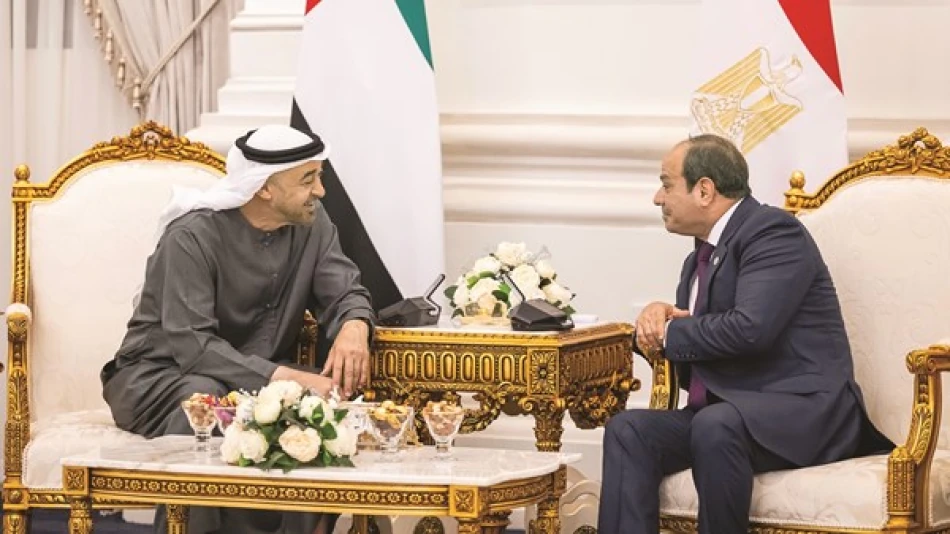
Egypt's Media Spotlight Shines on President's High-Profile Visit
UAE-Egypt Summit Signals New Regional Power Axis Amid Middle East Turbulence
A high-profile meeting between UAE President Sheikh Mohammed bin Zayed Al Nahyan and Egyptian President Abdel Fattah El-Sisi in Egypt's New Alamein City has captured widespread attention across Egyptian media, positioning the two nations as a formidable alliance capable of shaping Middle Eastern geopolitics. The summit, held against the backdrop of regional instability and Gaza tensions, underscores how economic partnerships are evolving into strategic political coordination.
Strategic Timing Reflects Regional Urgency
The choice of New Alamein as the meeting venue carries symbolic weight. This emerging Mediterranean city represents Egypt's ambitious development vision, while the UAE's continued investment in Egyptian mega-projects demonstrates Abu Dhabi's long-term commitment to Cairo's economic transformation. Egyptian media outlets unanimously characterized the visit as a "pivotal strategic milestone" that reveals deep political dimensions.
The timing coincides with escalating tensions in Gaza and broader regional uncertainty, suggesting both leaders recognize the need for coordinated Arab responses to crisis management. Unlike previous diplomatic meetings focused primarily on bilateral trade, this summit emphasized joint positioning on regional files.
Economic Partnership Evolves Into Political Alliance
Beyond Traditional Cooperation
Egyptian newspaper coverage highlighted how the relationship has matured beyond conventional economic cooperation into comprehensive strategic partnership. Al-Ahram described the meeting as embodying "comprehensive and integrated partnership between Cairo and Abu Dhabi," while Al-Watan emphasized the "mutual support messages" exchanged between the leaders.
This evolution mirrors similar regional partnerships, such as the Saudi-UAE coordination mechanism established in 2017, but with Egypt's demographic weight and geographic position, the UAE-Egypt axis potentially carries greater influence across North Africa and the Eastern Mediterranean.
Investment as Diplomatic Tool
The UAE's substantial investments in Egyptian infrastructure projects—from the New Administrative Capital to renewable energy initiatives—have created economic interdependence that now translates into political alignment. This model differs from traditional aid relationships, positioning both countries as equal partners rather than donor-recipient dynamics.
Gaza Crisis Coordination Reveals Broader Strategy
Egyptian media reports emphasized both nations' "aligned visions regarding the Gaza situation" and the necessity of enhanced joint Arab efforts to halt escalation. This coordination suggests a pragmatic approach to Palestinian issues, potentially offering alternative pathways to the traditional Qatar-Turkey mediation channels.
The UAE's normalization with Israel through the Abraham Accords, combined with Egypt's long-standing peace treaty and Gaza border management role, creates a unique diplomatic configuration that could prove crucial in future peace negotiations or reconstruction efforts.
Regional Implications and Power Dynamics
Countering Iranian Influence
While not explicitly stated, the strengthened UAE-Egypt partnership serves as a counterweight to Iranian regional influence. Both nations have experienced tensions with Tehran—the UAE over territorial disputes and regional proxy conflicts, Egypt over Red Sea security and Houthi threats to shipping lanes.
Arab Leadership Vacuum
With traditional Arab powerhouses like Iraq and Syria weakened by internal conflicts, and Saudi Arabia focused on domestic transformation under Vision 2030, the UAE-Egypt axis fills a leadership vacuum in Arab regional affairs. Their combined economic resources, diplomatic networks, and military capabilities position them as key regional stabilizers.
Market and Investment Perspective
For investors, this deepening partnership signals continued UAE commitment to Egyptian markets despite regional volatility. The symbolic breakfast meeting on Alamein's beach, extensively covered by Egyptian media, reinforces confidence in long-term bilateral stability that transcends typical Middle Eastern political turbulence.
The partnership model also attracts international investors seeking regional stability anchors. Unlike volatile political alliances, the UAE-Egypt relationship rests on substantial economic interdependence and complementary strategic interests, making it more durable than personality-driven diplomatic arrangements common elsewhere in the region.
Looking Forward: Institutionalizing Partnership
Egyptian media emphasis on "continuous coordination and permanent consultation at the highest levels" suggests both nations are moving toward institutionalizing their partnership beyond personal relationships between leaders. This approach mirrors successful regional blocs like the Gulf Cooperation Council, potentially creating a new model for Arab interstate cooperation.
As regional challenges intensify—from climate change impacts to migration pressures and energy transitions—the UAE-Egypt partnership may evolve into a broader alliance incorporating other moderate Arab states seeking stability-focused development strategies over ideological confrontations.
Most Viewed News

 Layla Al Mansoori
Layla Al Mansoori






